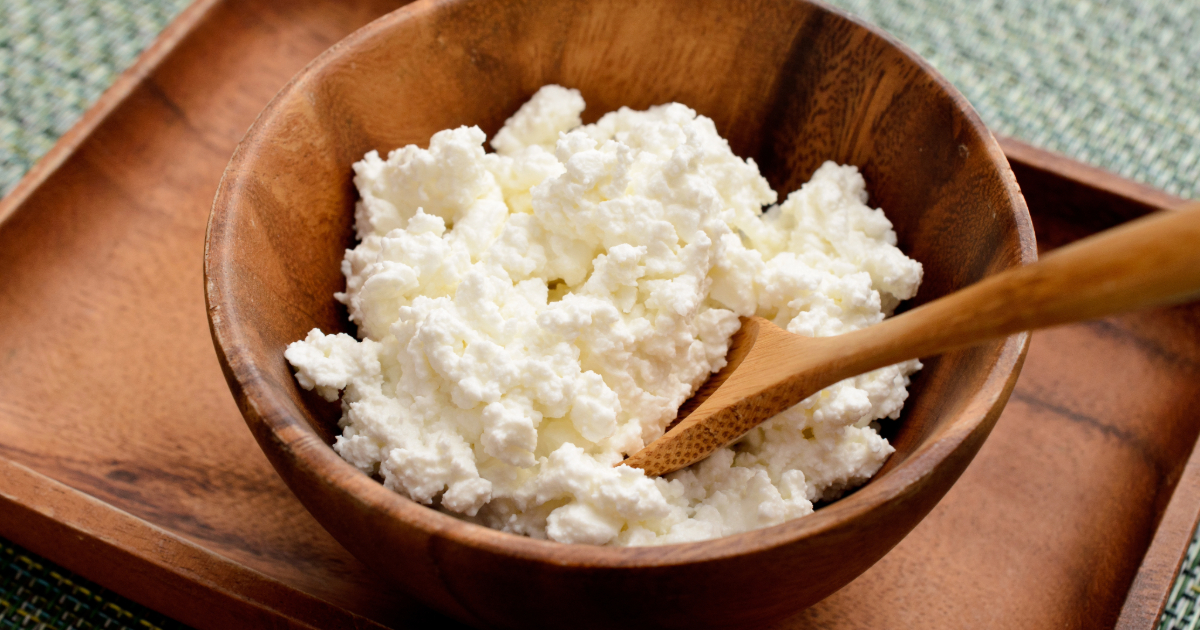Farmer's cheese and ricotta cheese are two types of fresh, soft white cheeses that have some similarities but also key differences.

When following a recipe, it's important to understand how these two cheeses differ in terms of production method, texture, flavor, and best uses.
How Farmer's Cheese Is Made
Farmer's cheese is a simple fresh cheese that has origins as a way for farmers to preserve excess milk. To make farmer's cheese, cow's milk is coagulated using an acid like vinegar or lemon juice. This causes the milk proteins to curdle and form curds. The curds are then separated from the whey and are salted and pressed to remove moisture. The pressing is what gives farmer's cheese its characteristic crumbly, dry texture. Farmer's cheese can be consumed fresh or it can be aged for a firmer texture.
Because of the simple ingredients and method to make it, farmer's cheese is considered one of the easiest cheeses to produce, even at home. No aging or culturing is required and it can be made and consumed right away.
Some key things that characterize farmer's cheese:
- Made from cow's milk (sometimes a blend of cow and goat milk)
- Curdled using an acid like vinegar
- The curds are pressed, giving a drier, crumbly texture
- Mild tangy flavor
- Fresh and spreadable or can be aged into a firmer cheese
How Ricotta Cheese Is Made
In contrast, ricotta cheese is not made directly from milk. Instead, it's made from the leftover whey from the production of other cheeses. The whey contains proteins and nutrients that would normally go to waste. To make ricotta, the whey is reheated, which causes the remaining proteins to coagulate into curds, which are then collected by draining through a fine sieve.
The reheating step is why ricotta cheese gets its name, as "ricotta" means re-cooked in Italian. After draining, the curds make up fresh ricotta cheese. As a whey cheese, ricotta has more moisture and a softer texture than farmer's cheese.
Key things that characterize ricotta cheese:
- Made from leftover whey from cheesemaking
- Reheated to coagulate remaining proteins into curds
- Drained curds result in the fresh cheese
- High moisture content gives a creamy, spoonable texture
- Mild sweet flavor
- Best consumed fresh
Key Takeaway: The main difference in production is that farmer's cheese starts with milk, while ricotta uses leftover whey. Farmer's cheese curds are pressed, giving a drier texture versus ricotta's soft creamy texture.
Comparing the Texture
When following a recipe, texture is an important consideration when substituting ricotta or farmer's cheese. Farmer's cheese has a drier, crumbly texture that comes from pressing out the whey during production. In comparison, ricotta's texture is creamy, smooth, and fairly spoonable, owing to its high moisture content.
Some examples where the differing textures matter:
- Farmer's cheese holds its shape better when cooked or baked. Its crumbles make an excellent topping that won't melt away.
- Ricotta works better as a spread or dip since it is soft and creamy.
- Farmer's cheese gives more texture in salads or sandwiches.
- Ricotta blends easily into smooth fillings for ravioli, cannoli, or cheesecake.
Keep texture in mind if swapping these cheeses in recipes. Farmer's cheese brings a pleasant crumble while ricotta imparts creaminess. Adjust moisture as needed by draining ricotta or adding cream cheese to farmer's cheese.
Key Takeaway: Farmer's cheese has a crumbly texture from pressing while ricotta's texture is creamy and spoonable due to higher moisture.
How the Flavors Compare
In addition to differences in textures, farmer's cheese and ricotta also vary slightly in terms of flavor profiles. Of course there can be variation depending on factors like milk type or aging, but some general comparisons can be made:
- Farmer's cheese tends to be mildly tangy with a flavor that comes through more than ricotta. It may have a slight sweetness as well depending on milk type.
- Ricotta cheese is mildly sweet and creamy. Its flavor is delicate, which allows other ingredients to take center stage when cooking.
- Since it's made from whey, ricotta has a recognizable milky or whey flavor.
- Farmer's cheese offers more prominent dairy flavors since it is made directly from milk.
Both cheeses have gentle flavors that pair well with either sweet or savory dishes. However, farmer's cheese provides a bit more tangy dairy flavor compared to ricotta's muted milky sweetness.
Keep these flavor differences in mind when using these cheeses. Adjust other flavors like herbs, honey, or fruits to balance out the cheese's contribution.
Key Takeaway: Farmer's cheese has a tangy dairy flavor while ricotta tends more mild and milky sweet. Ricotta's delicate flavor allows other ingredients to shine.
Popular Uses for Each Type of Cheese
When deciding which soft cheese to use, consider how farmer's cheese and ricotta are used in dishes:
Common Uses for Farmer's Cheese
The crumbly texture and tang make farmer's cheese versatile for cooking or enjoying fresh:
- Excellent in blintzes or pasta fillings to provide texture
- Adds flavor when baked into breads or used in pie crusts
- Can be sliced or grated to top casseroles or gratins before baking
- Mixed with herbs and shaped into a spreadable cheese ball appetizer
Farmer's cheese holds up well to cooking while adding a pleasant dairy tang. Its firm texture means it won't disappear or break down with high heat. Sprinkle crumbles onto pizza, salads, or soups right before serving.
Common Uses for Ricotta Cheese
The soft and creamy qualities of fresh ricotta cheese lend well to these uses:
- Blends smoothly into dips, spreads
- Often used as filling for cannoli and ravioli
- Adds moisture and richness to baked goods like pancakes
- Great base ingredient for cheesecake or tiramisu
- Excellent way to add creaminess to pasta sauces
Fresh ricotta cheese has a high moisture content, so it has a tendency to break down when cooked at high temperatures. Mix it gently into dishes at the end to retain its delicate texture.
Key Takeaway: Farmer's cheese crumbles hold their shape when cooked but ricotta cheese blends more smoothly into spreads, fillings, and desserts.
FAQs
Can I use farmer's cheese instead of ricotta in lasagna?
Yes, farmer's cheese can substitute for ricotta in most recipes. The two cheeses have a similar fresh, mild flavor. However, the texture differs, with farmer's cheese having noticeable crumbles versus ricotta's smooth creaminess.
To compensate when substituting into lasagna, mix cream cheese into the farmer's cheese. This helps mimic ricotta's moisture level. Or, simply drain excess liquid from the ricotta by lining a sieve with cheesecloth. The firmer texture allows it to bake into lasagna more like farmer's cheese.
What's a good substitution if I don't have farmer's cheese or ricotta?
In a pinch, cottage cheese makes an acceptable substitute for either ricotta or farmer's cheese. The curds give it a similar texture, although cottage cheese tends to be more acidic in flavor. For a closer flavor match, substitute cream cheese or mascarpone.
To reproduce ricotta's texture, puree or blend the cottage cheese first. For a ricotta or farmer's cheese replacement in baked goods, mix together cream cheese with milk or yogurt to form the moisture level you need.
Is one cheese healthier than the other?
Farmer's cheese tends to be lower in fat and calories compared to ricotta. So if you're looking specifically for a lower-fat option, farmer's cheese may fit better into a healthy diet. However, both cheeses can be part of a balanced diet.
Opt for part-skim or low-moisture versions of either cheese to reduce fat and calories without compromising taste and texture. In their full-fat forms, farmer's cheese and ricotta offer protein, calcium, and other nutrients. As with any food, pay attention to your portion sizes when adding these nutritious cheeses to meals or snacks.
Conclusion
While ricotta and farmer's cheese bear some basic similarities and can substitute for one another in recipes, they have distinct differences when it comes to production method, texture, flavor, and best uses. Both play roles in certain cuisines, with farmer's cheese more prominent in Slavic dishes and ricotta being integral to Italian food.
Their unique textures—the signature crumbly, drier quality of farmer's cheese and smooth, creamy ricotta—factor heavily into how each cheese behaves in cooking. Similarly, ricotta's delicate milky sweetness stands apart from the tangy dairy flavor of farmer's cheese.

